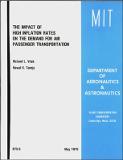| dc.contributor.author | Vitek, Richard Leo | en_US |
| dc.contributor.author | Taneja, Nawal K. | en_US |
| dc.contributor.other | Massachusetts Institute of Technology. Flight Transportation Laboratory | en_US |
| dc.date.accessioned | 2012-01-06T06:49:10Z | |
| dc.date.available | 2012-01-06T06:49:10Z | |
| dc.date.issued | 1975 | en_US |
| dc.identifier | 02152592 | en_US |
| dc.identifier.uri | http://hdl.handle.net/1721.1/67947 | |
| dc.description | Originally written as the first author's M.S. thesis, Massachusetts Institute of Technology, Dept. of Aeronautics and Astronautics, 1975 | en_US |
| dc.description | May 1975 | en_US |
| dc.description | Includes bibliographical references (p. 116-117) | en_US |
| dc.description.abstract | The impact of high inflation rates on the demand for domestic air passenger transportation is tested in a demand model using time-series data and linear and non-linear least squares regressions with Revenue Passenger Miles as the dependent variable, and measures of cost, income and inflation as the explanatory variables. The investigation begins with an extensive survey of the past and current air transportation demand models. The model selected uses linear and non-linear log specifications to account for the secular trend and detrended variables to account for the cyclical variations. These transformations allow determination of the coefficients comparable to delta log models and simultaneously retain the forecasting ability of linear log models. Forecasts are provided to 1990 for both the linear and non-linear secular trends. Results show that the price is the most stable and significant determinant of demand. Income and the rate of inflation are both significant but are more variable and highly dependent on the type of secular trend and the time period used in the regression. The non-linear secular trend model provided the best overall fit and explained 96% of the variation in demand. | en_US |
| dc.format.extent | 117 p | en_US |
| dc.publisher | Cambridge, Mass. : Flight Transportation Laboratory, Dept. of Aeronautics and Astronautics, Massachusetts Institute of Technology, [1975] | en_US |
| dc.relation.ispartofseries | FTL report (Massachusetts Institute of Technology. Flight Transportation Laboratory) ; R75-6 | en_US |
| dc.subject | Aeronautics, Commercial | en_US |
| dc.subject | Supply and demand | en_US |
| dc.subject | Regression analysis | en_US |
| dc.subject | Least squares | en_US |
| dc.subject | Inflation (Finance) | en_US |
| dc.subject | Passenger traffic | en_US |
| dc.subject | Mathematical models | en_US |
| dc.subject | United States | en_US |
| dc.title | The impact of high inflation rates on the demand for air passenger transportation | en_US |
| dc.type | Technical Report | en_US |
